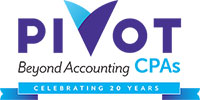
Employee Benefit Plan Audits
Skilled, experienced audit services from the largest locally-owned accounting firm in Northeast Florida. Pivot helps meet your employee benefit plan’s annual audit and filing requirements.
The regulations governing the fiduciary responsibility of employee benefit plan sponsors are complex and often time-consuming. And the failure to accurately comply with all requirements can carry with it hefty penalties. With heightened government scrutiny, layered ERISA and DOL requirements, and new changes from SECURE ACT 2.0, are you confident that your employee benefits plan is compliant with all applicable requirements?
Work with a firm that believes the audit process is an opportunity, not a burden. We don’t see stress and complexities; we see fresh ideas and enhanced efficiencies. Choosing Pivot to conduct your next employee benefits plan audit is the right choice for a sound financial future for your organization.
Expert EBP Audit Solutions from Pivot
Why does our firm stand out from the crowd? We have built a reputation for providing excellent service and forming long-lasting relationships with our clients. Our assurance team is well-versed in the practices, rules and standards that apply to employee benefit plans. Pivot is a member of the American Institute of Certified Public Accountants’ (AICPA) Employee Benefit Plan Audit Quality Center (EBPAQC), a firm-based voluntary membership center for firms that audit EBPs. We support its mission to ensure the quality and integrity of all employee benefit plans.
Advantages of Pivot’s EBP Audits:
- A dedicated team of audit professionals.
- Strong technical knowledge of GAAP, GAAS, ERISA and DOL requirements.
- Continuity of professionals from year-to-year to enhance efficiencies.
- Significant and up-to-date knowledge of regulatory requirements.
- Integration and communication with your third-party plan administrator.
Our Assurance Services team is led by industry experts dedicated to delivering excellence:
- Sheryl Tschimpke, CPA – Assurance Partner
- Mallory Salter, CPA – Assurance Partner
- Kyle Vincent, CPA – Senior Assurance Manager
- Ashlyn Brannan – Assurance Manager
Employee Benefits Plan Audit Services:
An EBP audit with Pivot results in a high level of efficiency, reliability, and quality throughout the entire audit process. Our audit experience includes:
- ERISA Sec 103(a)(3)(C) audits (Limited Scope 401(k) plans)
- ERISA Non Sec 103(a)(3)(C) audits (Full scope 401(k) plans)
- Profit sharing and stock ownership plans ( ESOP)
- Defined benefit pension plans
- Health and welfare plans
- Initial and stub period audits
- Plan mergers, acquisitions, and terminations
- Form 5500 Filings
How Pivot Can Help:
- Maintain compliance
- Support your fiduciary duty
- Mitigate risk
- Decision making
- Preparation of IRS Form 5500 and Summary Annual Reports
Elements of an Employee Benefits Plan Audit:
Before diving into the dimensional world of EBP audits, it’s important to understand ERISA and DOL requirements, as well as the SECURE ACT 2.0.
The Employee Requirement Income Security Act (ERISA) mandates annual audits for retirement plans subject to its provisions, one of them being that plans must have 120 or more participants to fall under this requirement. ERISA also requires plans to provide participants with essential plan information like operations, features, and funding.
ERISA sets the standards for benefit accrual, vesting, and participation, giving participants the legal right to sue for benefits in the case of breaches in fiduciary responsibilities. ERISA insists that plans must also establish a plan for participants to appeal benefit decisions. Certain plan benefits are guaranteed through the Pension Benefit Guaranty Corporation (PBGC). Finally, fiduciary responsibility is a must for those managing and controlling plan assets according to ERISA requirements.
The U.S. The Department of Labor (DOL) enforces various employment and labor regulations to ensure compliance and that both workers and employers are treated fairly. Employers sponsoring 401(k) plans are required to file Form 5500 annually with the IRS and the DOL. The DOL reviews these filings to identify potential issues of discrepancies and also conducts quality review of CPAs who perform audits of employee benefit plans, including 401(k)s.
The SECURE ACT 2.0 is a key piece of new legislation crafted to enhance retirement savings options for Americans. SECURE stands for Setting Every Community Up for Retirement Enhancement. Are you up to speed on its changes to 401k and other employee benefit plans?
- There are parts of this effective in 2024 through 2027.
- Changes the landscape for 401k plans to empower more employees to increase retirement readiness.
- Changes in audit requirements for employee benefit plans.
